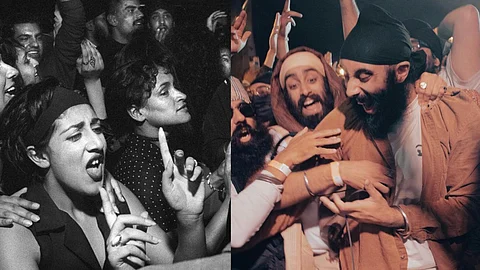
- HOMEGROWN WORLD
- #HGCREATORS
- #HGEXPLORE
- #HGVOICES
- #HGSHOP
- CAREERS
- ABOUT US
- CONTACT US

The UK witnessed its first cultural rebellion in the 1980s with daytime raves; young South Asians escaped their sheltered households to experience an amalgamation of Bhangra (a genre of music that originates from Punjab) and UK Garage music. These parties were set in clandestine halls that were booked every Wednesday afternoon to maintain secrecy from strict South Asian parents. This collective endearingly came to be known as Daytimers and made a mark by shifting away from stereotypical boundaries of ‘brownness’ that governed their public lives.
Daytimers produced a generation of new wave Desi DJs and producers who held onto their cultural identities and integrated it with their British environments without mediating their authenticity for the Western gaze. As time went by, these daytime raves took a backseat as the South Asian youth felt more at home in the UK.
Almost four decades later, this revolutionary act of making space for Desi diaspora became a crucial gateway for the British South Asians making music. Along came Daytimers UK, a music and art collective born from the deafening silence of Covid 19’s first lockdown. Co-founder of Daytimers UK and DJ-producer Provhat Rahman tells The Guardian ‘I felt like I was on my own, that there wasn’t anyone who looked like me’.
The collective went on to form a roster that supported and gave a platform to South Asian creatives in the music industry, and expanded its wings to collaborate with other desi collectives. Daytimers UK have hosted events to foster support back home in India too; their 24-hour livestream in support of farmers gathered donations amounting £12,000, all of which were put into the Khalsa Aid foundation.
Daytimers had a groundbreaking moment with their Boiler Room sets, which is a music broadcasting platform that promotes underground club culture globally. Yung Singh, DJ and core member of the collective, presented his Daytimers entourage beside himself at Boiler Room, and introduced the new wave of South Asian presence in the electronic and dance music scene. As his set came to an end, an emotional Yung Singh was seen as he played classic UK Bhangra hits from the 1980s and ‘90s.
Yung Singh echoes this sentiment in his interview with Crack Magazine "We want a seat at the table. In fact, we want several seats at the table, but we want to build our own house as well."
Daytimers UK is a reminder that culture is not just about music and art; it's about creating a space for self-expression, creativity, and community.
